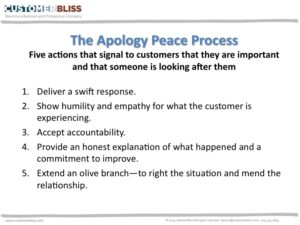Robert Wright, in his book, Nonzero: The Logic of Human Destiny, explains that we would all be better served by looking at solutions from a “nonzero” perspective, meaning there doesn’t have to be a “winner” and a “loser.”
Wright’s assertion is that because of our interdependence with others, whether they are companies and their customers or family members, non-zero-sum game solutions are the most ideal. This holds true in business. Companies that are beloved don’t take apologizing as admitting defeat. It’s part of the journey toward becoming a better company.
Apologizing well for operational gaffes, service blunders, and widespread tragedies or missteps drives company prosperity because, when done well, these apologies strengthen the bond between customer and company. They define the people inside the company, their values and who they are.
In a thoughtful and well-executed apology, the focus is on restoring and preserving the relationship; it is about the people impacted and the human connection with them.
The manner in which these companies decide to acknowledge and repair the mistake is done in a non-zero-sum manner. Both sides win. Customers feel they have been honored, acknowledged, and taken care of. Companies continue to prosper. These solutions appeal to the natural order of humanity. They become a peace process where both sides win. Apologizing well is an important “peace process” between companies and their customers.
The apology peace process between companies and customers is comprised of five actions that signal to customers that they are important and that someone is looking after them:
- Deliver a swift response.
- Show humility and empathy for what the customer is experiencing.
- Accept accountability.
- Provide an honest explanation of what happened and a commitment to improve.
- Extend an olive branch—to right the situation and mend the relationship.





This is so true. One of the most annoying things to a customer is an organisation who won’t admit when they’re wrong, or do an apology in a backhanded way that implies it’s partly the customer’s fault for not doing xyz or not knowing about a certain policy. Humility and honesty are key.